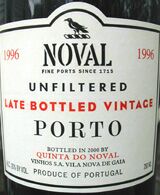|
A few quick notes For information about the Boston Wine Expo, visit the Expo Website, http://www.wine-expos.com/boston/index.html. If any of you are in the Boston area and plan to attend the Expo, feel free to contact me by E-mail at wine@wineloverspage.com - perhaps we can arrange a meeting Saturday or Sunday at a central point. Finally, I would like to thank the many of you who responded to last week's reader survey about The Wine Advisor. If you haven't dropped by yet, the survey remains open at http://www.wineloverspage.com/votebooth/tswaques2002.shtml, and you can view the responses at http://www.wineloverspage.com/votebooth/tswapoll2002.shtml. Some time soon, I will put up a special page with some of my comments and responses to specific questions.
Bottled late, enjoyed early In the first place, it is expensive. Not as stratospheric in price as the top Bordeaux or Burgundy or "cult" New World wines, maybe; but in recent years the price tags on top labels from excellent vintages like 1994 have risen close to $100. In the second place, Vintage Port is one of the great wines that almost REQUIRES bottle age before it is ready to drink. Although it is certainly possible to drink a young one with enjoyment - particularly in the case of a ripe, relatively accessible vintage like '94 - it's arguably a waste to quaff a great port from a fine vintage before its 20th birthday. So what's a self-indulgent wine lover to do? Fortunately, there are other ways to get a taste of the greatness that is Port without having to wait decades or spend huge sums for the experience. Tawny Port, non-vintage Port, Port-style wines from Australia and other places far from the home of genuine Port in Portugal all offer alternatives, and we'll examine all these and more in future columns. Today, though, let's take a look at what may be the closest fair approximation: Late Bottled Vintage (LBV) Port. A relatively recent innovation, Late Bottled Vintage was developed specifically for restaurant service and consumers who don't want to wait. What's the difference? True Vintage Port is made from the top grapes grown during the best vintages, and it is put in bottles after only two years in wood barrels, while it is still rough and harshly tannic. These are qualities that render it difficult to enjoy in youth but that provide the material it needs to mature into wondrous complexity over time. Late Bottled Vintage, in contrast, might be considered "next best." Generally made in less successful vintages or with grapes from younger vines, it is held in barrels for four to six years, the additional time in wood serving to soften its rough edges until it is mellow enough to enjoy as soon as it is bottled and sold. This procedure also eliminates the murky sediment that makes it advisable to "decant" Vintage Port; LBV wine can usually be served direct from the bottle. LBV Port must be clearly identified on the label, which also must state both the vintage and the year that the wine was bottled. It generally sells for one-half to one-fourth the price of the Vintage product. If you want to know more about the various types of Port and their enjoyment, you might enjoy Jason Brandt Lewis's article, "Wine Seminar: A quick overview of Port wine," at http://www.wineloverspage.com/port/jbl030197.shtml. What do you think? Join in a discussion on this and other topics in our interactive Wine Lovers' Discussion Group at http://www.wineloverspage.com/cgi-bin/sb/index.cgi?fn=1. Or send me E-mail by clicking to http://www.wineloverspage.com/ask_a_question.phtml. I regret that the growing circulation of the "Wine Advisor" makes it difficult for me to reply individually to every note. But I'll respond to as many as I can and do my best to address specific questions. Please be assured that all your input helps me do a better job of writing about wine. Please tell your wine-loving friends about The 30 Second Wine Advisor, and invite them to register for their own free subscription at http://www.wineloverspage.com/wineadvisor.
 Noval 1996 Unfiltered Late Bottled Vintage Porto ($24.99)
Noval 1996 Unfiltered Late Bottled Vintage Porto ($24.99)Inky dark purple, blackish and opaque. Strong licorice scent over spicy cloves and simple black fruit aromas. Much more accessible on the palate, sweet and tart plummy fruit but not sticky-sweet, and frankly the better for that. U.S. importer: William Grant & Sons Inc., NYC. (Jan. 12, 2002) FOOD MATCH: Fresh cracked pecans, a traditional accompaniment, seem to mellow the tannins and bring up the wine's more complex fruit flavors. WEB LINK: The winery Website (in English) is at http://www.quintadonoval.com/.
What wine with pizza?
Looking for a wine adventure? Receive two bottles of award-winning wine each month for just $32.95 plus shipping. Each shipment includes the Club's eight-page newsletter, Uncorked. Visit http://www.cawineclub.com or call (800) 777-4443. Mention you saw it on the Wine Advisor and get three bottles for the price of two in your very first shipment.
"Emeril's Missing Ingredient Sweepstake" will present a recipe for a good wine-pairing dish from Lagasse's latest book, "Prime Time Emeril" ... with one essential ingredient missing. Your challenge is to study the recipe and figure out what key ingredient has been left out. Winners will get a free, autographed copy of Lagasse's latest book, "Prime Time Emeril," and the Grand Prize winner will win an entire Emeril Cookbook collection. To join the fun, click to http://www.wineloverspage.com/emeril/index.phtml for the entry form and instructions.
We welcome feedback, suggestions, and ideas for future columns. We do not use this list for any other purpose and will never give or sell your name or E-mail to anyone. All the wine-tasting reports posted here are consumer-oriented. In order to maintain objectivity and avoid conflicts of interest, I purchase all the wines I rate at my own expense in retail stores and accept no samples, gifts or other gratuities from the wine industry.
Monday, Jan. 28, 2002
Subscribe (free) to The 30 Second Wine Advisor
|